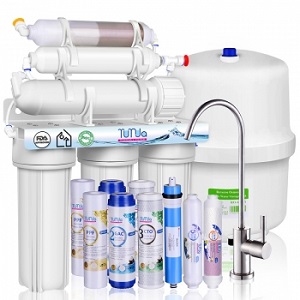Purification vs Filtration
When it comes to finding and drinking water, the first thing you need to know is the difference between water filtration and purification. They are not synonyms.
Water filtration is the elimination of debris, and some bacteria, by way of some type of cloth or mesh net — a sieve — through which the water flows.
Water purification is a chemical or UV process of rendering bacteria and other harmful agents inoperative. The chemicals (or heat) in these purification methods essentially deactivate the bad stuff, making it safe for consumption.
Sometimes water needs both of those processes; sometimes it only needs one. Knowing the difference, though, can truly save your life. If you’re backpacking in Africa and think you only need a filter, you could end up with a deadly disease in your system. So let’s get a little more into the differences between the two.
Water Filtration
Using a water filter, especially a commercially tested one (versus just the DIY backwoods variety), can indeed eliminate some bacteria. But not all. Filters can take care of protozoa and bacteria, but they can’t get rid of any viruses present in the water — those are simply too small for the mesh to catch.
Generally, for backpacking and survival purposes, water in the U.S. and Canada is rated as safe for filtration-only methods and devices; this is especially true for mountainous areas. When folks get sick while backpacking or camping and blame it on the water, it’s often found to actually be sanitation-related (not washing hands, not disposing of waste properly or far enough from campsite, etc.).
Filtering water also ensures the best flavor. Your H2O will taste natural and will be immediately drinkable, whereas some purification methods either alter the taste and/or take up to a few hours to make the water safe.
The bottom line is that filters work to rid the water of impurities — including dirt as well as microscopic bacteria — but aren’t completely effective in making the water safe to drink. If it’s all you have, you’ll likely be okay, but know that negative consequences are still possible.

Water Purification
Water purification makes H2O safe to drink by deactivating all harmful pathogens, including viruses. Purification doesn’t eliminate contaminants though. Dirty water that’s been purified is still dirty water, and probably needs filtering (that should happen first, actually).
Purification happens primarily through boiling, chemical agents, or UV light. It’s especially important when traveling outside first world countries, where viral infections are more common.
Water filters are designed to remove impurities and contaminants, ensuring that ...
With the increasing demand for high-quality water filters, it's essential to fin...
In this article, I will discuss the importance of clean water and the benefits o...
Whole house water filters ensure that raw water is treated as it enters your hou...
The water filter indicator on top of the LG refrigerator can remind you to chang...
If you cook a lot at home, especially fried food, you are no stranger to the smo...
China Top 3 Water Filter Manufacturer
Welcome to visit our website. Subscribe to our website, we will not only provide awesome discounts, but also share the information of the most popular products in the market.

